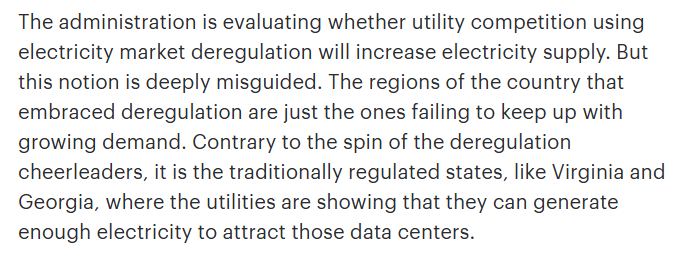
Economics, Electric power markets, US energy policy, price gouging and price regulation. Pro-market. Texas Tech U & GMU. Unhappy fan of #TottenhamHotspurs.
How to get URL link on X (Twitter) App


 Some of my objections may be matters of interpretation of complex issues. Let's focus on the more objective, easy-to-check claims that fail when actually checked. Are Virginia and Georgia meeting the needs of fast growing demands compared to restructured states?
Some of my objections may be matters of interpretation of complex issues. Let's focus on the more objective, easy-to-check claims that fail when actually checked. Are Virginia and Georgia meeting the needs of fast growing demands compared to restructured states? 
https://twitter.com/joshuabasseches/status/1879009742238200101But that requires a consumer-oriented transmission planning process. Instead we have a system that prioritizes utility-preferred projects over efficiently serving consumers. utilitydive.com/news/ferc-loca…

 The press release is linked and the full text of the letter is available with the press release. 2/6 ag.ny.gov/press-release/…
The press release is linked and the full text of the letter is available with the press release. 2/6 ag.ny.gov/press-release/…

 I have written on price gouging laws and I am an economist—I may be exactly the sort of expert that our law professor-essayist wants you to ignore. You are warned. 🧵2 theatlantic.com/ideas/archive/…
I have written on price gouging laws and I am an economist—I may be exactly the sort of expert that our law professor-essayist wants you to ignore. You are warned. 🧵2 theatlantic.com/ideas/archive/…

 In Christie's view, the key issue is whether market designs will support winterization costs. He pointed to ERCOT's energy only market and all the non-utility generators there. "Where's the money going to come from?" he asked.
In Christie's view, the key issue is whether market designs will support winterization costs. He pointed to ERCOT's energy only market and all the non-utility generators there. "Where's the money going to come from?" he asked.
https://twitter.com/paulisci/status/1609597533340454912But not that it “wasn’t until 1925 that half of American homes were wired for electricity, and even in 1940, a third of U.S. homes still lacked a flush toilet.” apartmenttherapy.com/1920s-real-est…

 I was looking at data to see (a) how well my effort to program my smart thermostat worked, and (b) see the effect of utility's DR call on July 11 compared to my own efforts. On (a) the red line shows real savings during the peak, but (b) the blue line shows I could do better.
I was looking at data to see (a) how well my effort to program my smart thermostat worked, and (b) see the effect of utility's DR call on July 11 compared to my own efforts. On (a) the red line shows real savings during the peak, but (b) the blue line shows I could do better.